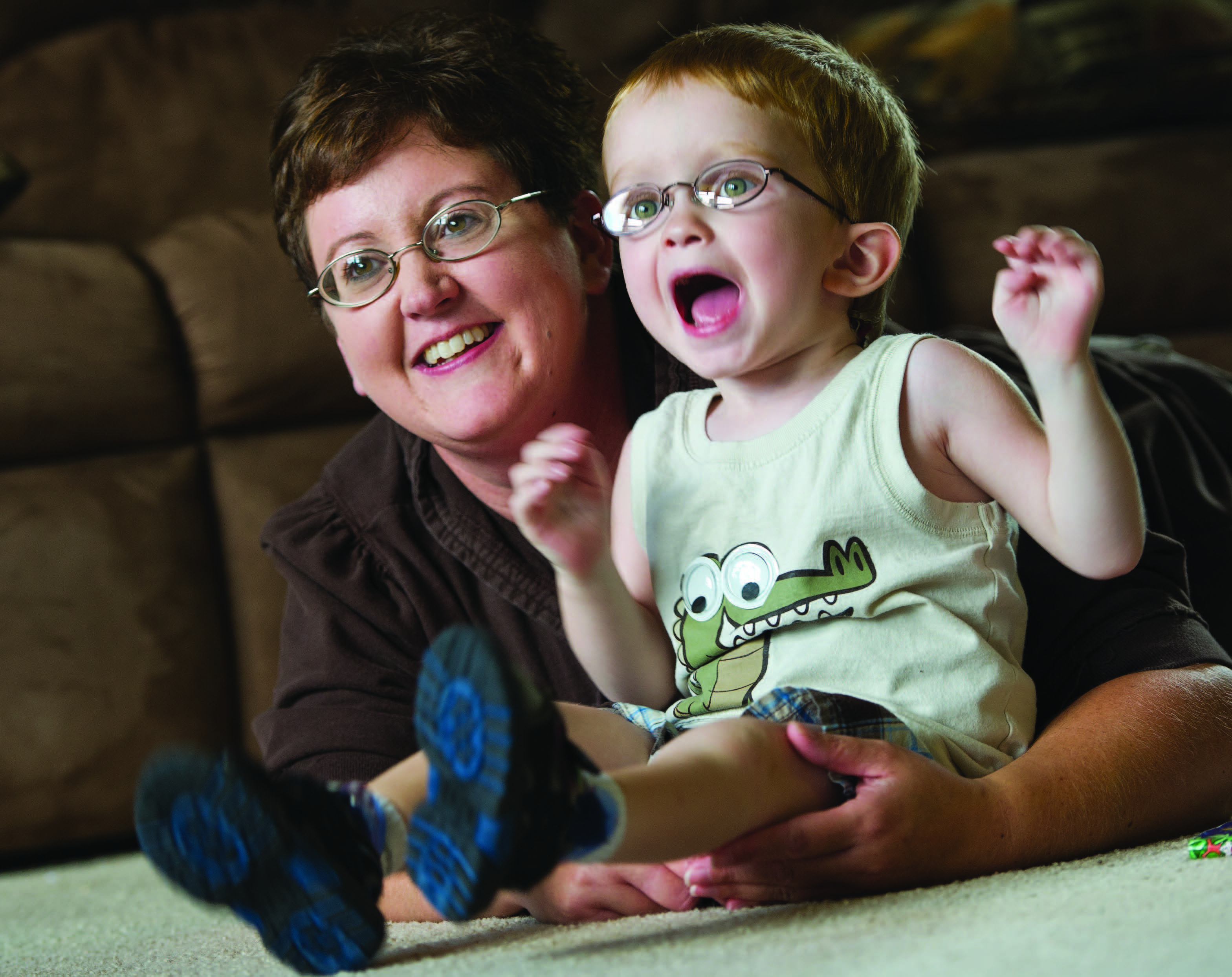Twenty weeks into the pregnancy of their second child, Amy and John Fleury received news that would alter their lives.
 Amy and Michael Fleury, Colby
Amy and Michael Fleury, Colby An ultrasound showed their baby had two congenital conditions: sacral agenesis, an under-developed spine and malformed internal organs; and hydrocephalus, the buildup of cerebrospinal fluid in the brain.
The Fleurys, who lived in Rhinelander at the time, were referred to specialists at Marshfield Clinic in Marshfield. "I was in shock for a couple days but so happy to learn about this in advance," Amy said. "The doctors down here are truly amazing."
They met with a maternal fetal medicine specialist, a genetics specialist and pediatric neurologist. They learned about a range of possibilities and how to prepare for them. Delays in motor skills, overall development, speech and language were possible, as were seizures.
Scans
Several scans were performed so specialists could determine which needs had the highest priority upon delivery, said Pediatric Neurologist
Monica Koehn, M.D. of Marshfield Clinic Marshfield Center. "We help parents know what they can anticipate in neonatal, at birth and the first few days and weeks of life."
Sacral agenesis is thought to be a variant of spina bifida. "The bottom part of the spine doesn't develop. As a result, multiple organs don't develop properly," Dr. Koehn said. The lower back, limbs and urinary and digestive tracts can be affected.
Michael was born full-term on August 3, 2009, and weighed more than six pounds. Three days later, he underwent two procedures. Neurosurgeon Sanjay Rao, M.D., placed a shunt to help drain extra fluid so it does not build up in the brain and spinal cord. This reduced chances of damage to surrounding structure. Buildup causes pressure inside the skull that can damage brain tissue.
He was born with an imperforate anus and no rectum. Pediatric Surgeon
Charles McGill, M.D., performed a colostomy to create a new opening in the abdomen for waste products to leave his body. The procedure involves diverting the large intestine. It can be challenging to find or create nerves and muscles so a child can have as near normal function as possible.
Terrifying
It was terrifying for Amy to think of her baby having a shunt and colostomy when he was only three days old. When Dr. McGill told her everything went well after 3 ½ hours of surgery, "I burst into tears, it was such a relief," she said.
After nine days in the neonatal intensive care unit (NICU) at Ministry Saint Joseph's Hospital, Michael went home to Colby.
"I was constantly worried – about the stitches, the bandages. We had colostomy issues. What else could go wrong?" Amy said. "I tried to stay calm and think positive."
Her good-natured boy relieved some of the angst. At six months, Michael was social, smiling and babbling, she said. "Mentally he's right on target. I think that's the biggest thing for me."
Like many babies with hydrocephalus, Michael's head was larger than normal, and flat on one side because of difficulty with movement. To help reshape his skull, Gary Ovaska, certified orthotist at Marshfield Clinic, fitted him with a custom-molded helmet. A laser scanner measures a baby's head in seconds without the need for sedation.
Dr. Koehn continues to monitor head circumference and pressure in the skull and assesses Michael's progress in development and alertness. "Overall he's making nice gains."
Michael has had frequent urinary tract infections. An abnormal connection between the anus and urethra caused discomfort and infection. Dr. McGill removed a small fistula in February 2012, and Michael has been much healthier and happier.
Pediatric Urologist Vincent Thomalla, M.D., monitors his urinary function. He uses ultrasound periodically to make sure Michael's kidneys are working well. At some point, they may need to make his bladder bigger, he said.
Seizure
At age two, Michael suffered his first seizure. He continues to have frequent, significant seizures, which have been difficult to treat despite many medications, Dr. Koehn said. "We may need to consider medication alternatives, such as the ketogenic diet." Seizure control is important for healthy development.
Numerous pediatric specialists care for Michael because of the complexity of his health condition and potential for complications. Gastroenterologist
Daryl Fish, D.O., monitors his abdominal organ function; Allergist Ejaz Yousef, M.D., addressed a recent peanut allergy; Ophthalmologist Dennis Anderson, M.D., monitors Michael's eyesight. Physical Medicine Specialist
Jill Meilahn, D.O., and occupational and physical therapists work with Michael on developmental and motor skills.
"Caring for children with complex multispecialty needs is a priority at Marshfield Clinic. All of the subspecialists are available right here in the same building. Communication is optimal among providers, who have one common goal of maximizing quality of care for all our patients," Dr. Koehn said.
Staff works to coordinate several appointments on the same day for the convenience of families traveling to Marshfield.
Coordinating
Pediatrician
Keith Pulvermacher, M.D., is Michael's primary doctor, coordinating with specialists as needed. "When Michael comes in sick, that's when you notice his complexity," he said. Making sure his medications are compatible is important.
"He has the potential for a lot of issues, but he's doing well. We've been able to predict his issues and stay ahead of them."
Michael's family is key to his care, Dr. Pulvermacher said. "His mom brings a list of concerns and we talk straight with each other."
"Dr. Pulvermacher is the best pediatrician we've ever seen. He keeps me in the loop, and asks how I want to proceed," said Amy, who also credited the Marshfield Clinic Pediatric Case Management team.
Michael is a happy boy and has fun with his bright, attentive big sister, Isabella, 6. "To see that smile, that's the greatest thing for me as a mom," Amy said.
